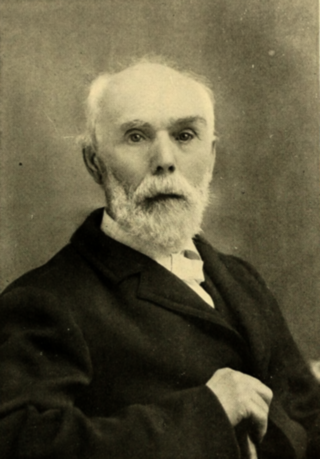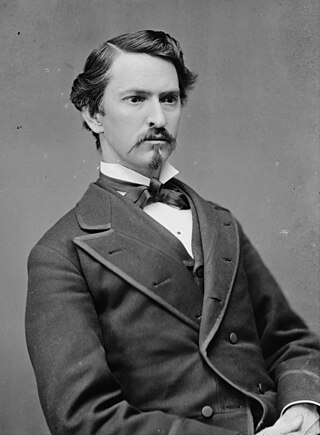| |||||||||||||||||
| |||||||||||||||||
| |||||||||||||||||
The 1866 Oregon gubernatorial election took place on June 4, 1866, to elect the governor of the U.S. state of Oregon. The election matched Republican George Lemuel Woods against Democrat James Kerr Kelly. [1]
| |||||||||||||||||
| |||||||||||||||||
| |||||||||||||||||
The 1866 Oregon gubernatorial election took place on June 4, 1866, to elect the governor of the U.S. state of Oregon. The election matched Republican George Lemuel Woods against Democrat James Kerr Kelly. [1]
| Party | Candidate | Votes | % | |
|---|---|---|---|---|
| Republican | George Lemuel Woods | 10,316 | 50.68 | |
| Democratic | James K. Kelly | 10,039 | 49.32 | |
| Total votes | 20,355 | 100 | ||
| Republican hold | ||||

The Seventeenth Amendment to the United States Constitution established the direct election of United States senators in each state. The amendment supersedes Article I, Section 3, Clauses 1 and 2 of the Constitution, under which senators were elected by state legislatures. It also alters the procedure for filling vacancies in the Senate, allowing for state legislatures to permit their governors to make temporary appointments until a special election can be held.

The 1975 Australian constitutional crisis, also known simply as the Dismissal, culminated on 11 November 1975 with the dismissal from office of the prime minister, Gough Whitlam of the Australian Labor Party (ALP), by Governor-General Sir John Kerr, who then commissioned the leader of the Opposition, Malcolm Fraser of the Liberal Party, as prime minister. It has been described as the greatest political and constitutional crisis in Australian history.

The governor of Oregon is the head of government of Oregon and serves as the commander-in-chief of the state's military forces. The title of governor was also applied to the office of Oregon's chief executive during the provisional and U.S. territorial governments.

The 1966 United States Senate elections were elections on November 8, 1966 for the United States Senate which occurred midway through the second term of President Lyndon B. Johnson. The 33 seats of Class 2 were contested in regular elections. Special elections were also held to fill vacancies. With divisions in the Democratic base over the Vietnam War, and with the traditional mid-term advantage of the party not holding the presidency, the Republicans took three Democratic seats, thereby breaking Democrats' 2/3rds supermajority. Despite Republican gains, the balance remained overwhelmingly in favor of the Democrats, who retained a 64–36 majority. Democrats were further reduced to 63-37, following the death of Robert F. Kennedy in June 1968.

The 1960 United States Senate elections coincided with the election of John F. Kennedy as president on November 8, 1960. The 33 seats of Class 2 were contested in regular elections. A special election was also held on June 28, 1960, for a mid-term vacancy in North Dakota where Democrats flipped a seat to expand their majority to 66–34. As Majority Leader Lyndon Johnson was elected Vice President, Mike Mansfield became the new majority leader.

George Lemuel Woods was an American lawyer, judge, and politician. A member of the Republican Party, Woods served as the third Governor of Oregon from 1866 to 1870. Failing to win renomination, Woods was then appointed Territorial Governor of Utah by President Ulysses S. Grant, serving in that position from 1871 to 1875.

The 1954 United States Senate elections was a midterm election in the first term of Dwight D. Eisenhower's presidency. The 32 Senate seats of Class 2 were contested in regular elections, and six special elections were held to fill vacancies. Eisenhower's Republican party lost a net of two seats to the Democratic opposition. This small change was just enough to give Democrats control of the chamber with the support of an Independent who agreed to caucus with them, he later officially joined the party in April 1955.

The 1990 United States House of Representatives elections was an election for the United States House of Representatives on November 6, 1990, to elect members to serve in the 102nd United States Congress. They occurred in the middle of President George H. W. Bush's term. As in most midterm elections, the President's Republican Party lost seats to the Democratic Party, slightly increasing the Democratic majority in the chamber. It was a rare instance, however, in which both major parties lost votes to third parties such as the Libertarian Party as well as independent candidates.

Addison Crandall Gibbs was an American politician. He was the second Governor of Oregon from 1862 until 1866, and previously served in the Oregon Territory's legislative body and later the state legislature.

James Kerr Kelly was an American politician born in Pennsylvania. He was a United States senator for Oregon from 1871 to 1877, and later Chief Justice of the Oregon Supreme Court. Prior to his election to the Senate he had been elected to both houses of the local legislature, serving in the Territorial House and State Senate, and was a member of the Oregon Constitutional Convention in 1857.

John Whiteaker was an American politician, soldier, and judge. A native of Indiana, he joined the army during the Mexican–American War and then prospected during the California Gold Rush. After moving to the Oregon Territory, he served as a judge and member of the legislature. A Democrat, Whiteaker served as the first state Governor of Oregon from 1859 until 1862 and later was Oregon's Congressman from 1879 to 1881. He also was president of the Oregon State Senate and Speaker of the Oregon House of Representatives.
James Henry Dickey Henderson was an American farmer and politician from the state of Oregon. A native of Kentucky, he lived in Missouri and Pennsylvania before moving to the Oregon Territory in 1852. He worked as a publisher, pastor, and farmer before entering politics as a Republican, and served one term in the United States House of Representatives representing Oregon.

Joseph Showalter Smith was an American lawyer and politician who served one term as a Representative from the U.S. state of Oregon from 1869 to 1871.

Lafayette Lane was an American lawyer and politician who served one term as a US Representative from the U.S. state of Oregon from 1875 to 1877. He was the son of Oregon Senator Joseph Lane and an uncle of future Oregon Senator Harry Lane.

The 1874–75 United States Senate elections were held on various dates in various states. As these U.S. Senate elections were prior to the ratification of the Seventeenth Amendment in 1913, senators were chosen by state legislatures. Senators were elected over a wide range of time throughout 1874 and 1875, and a seat may have been filled months late or remained vacant due to legislative deadlock. In these elections, terms were up for the senators in Class 1.

The 1948 United States Senate election in Oklahoma took place on November 2, 1948. Incumbent Republican Senator Edward H. Moore declined to run for re-election. A crowded Democratic primary, including the former Governor, multiple members of Congress, and several statewide elected officials, developed; former Governor Robert S. Kerr won a slim plurality in the initial primary and then defeated former Congressman Gomer Smith by a wide margin in the runoff. On the Republican side, Congressman Ross Rizley had an easy path to the nomination. Kerr defeated Rizley in a landslide, largely similar to President Harry S. Truman's landslide victory in Oklahoma over Republican presidential nominee Thomas E. Dewey.

The 1922 United States Senate special election in Pennsylvania was held on November 7, 1922. Incumbent Republican Senator George Pepper, who had been appointed to the seat by Governor William Sproul following the death of Boies Penrose, was elected to fill the remaining four years on the term to which Penrose had been elected in 1920. Pepper comfortably defeated five other candidates, including Democratic nominee Fred Kerr of Clearfield County.

The 1989 New Jersey gubernatorial election was held on November 7, 1989. Incumbent Republican Governor Thomas Kean was term-limited after two consecutive terms. Democrat James Florio, a U.S. Representative from Camden County and a twice-unsuccessful candidate for Governor, defeated Republican U.S. Representative Jim Courter by the lopsided margin of 61.2%-37.2%.

The 2022 United States House of Representatives elections in Oregon were held on November 8, 2022, to elect the six U.S. representatives from the state of Oregon, one from each of the state's six congressional districts. Primaries for these seats were held on May 17, 2022. The elections coincided with the elections and primaries of other federal and state offices.